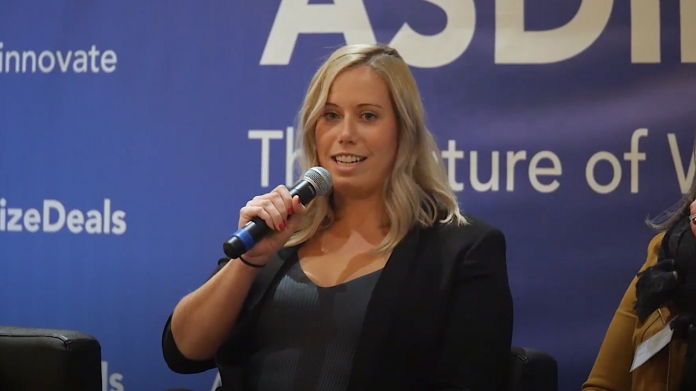As a results-focused professional, Brea Giffin fits perfectly as the Director of Sales and Partnerships of Sprout Wellness Solutions. She has “spent years working with companies all over the world to help them implement employee wellbeing programs and use them to solve complex and costly business problems.”
Brea Giffin also holds several degrees in various fields of human health. Her degrees include a BSc in Neuroscience as well graduate certificates in Health Promotion and Workplace Wellbeing. While working at Sprout, she “has been the driving force behind all new client acquisition—helping the company go from start-up to scale.”
According to Brea Giffin, Sprout has “ways to keep participants on track: setting goals, tracking progress, celebrating successes.” The company promotes a healthy engagement and wants its employees to participate in “fun, engaging exercises that build connection.”
As a wellbeing professional, Brea Giffin also recommends digital “team-based competition,” since it “offers camaraderie and exercise.” She says it “helps to focus on social and connected ways to improve physical health, and then you slide into focus on mental health, too.”
Brea Giffin says that Sprout “creates awareness, educates and connects to the right services.” The company is a “one-stop shop shopping exercise in getting a personalized wellness program in place, whether you’re after teletherapy, a yoga instructor or meditation lessons.” According to her, Sprout is a “hub of well-being.”
Check out more interviews with professional wellness experts here.
Jerome Knyszewski: What do you think makes your company stand out? Can you share a story?
Brea Giffin: I think there are a lot of things that make us stand out! One of the key things that makes us strong is the level of trust our leadership team has in our employees. We give employees a lot of opportunity to run with projects without hand holding. Occasionally, an employee will fail — but that provides great learning experiences for them in a safe environment. When a project is successful, the employee has an amazing win under their belt and as a company we all benefit from powerful new ideas and processes.
Jerome Knyszewski: Which tips would you recommend to your colleagues in your industry to help them to thrive and not “burn out”?
Brea Giffin: I’ve been a victim of this myself so hopefully people who are reading this won’t make the same mistake I did. One time I worked so hard on a huge proposal that my knee locked in place from sitting in one place for so long. It forced me into bed for two days and it was so painful I could barely work. If I had just prioritized myself a little bit each day then I would have been better off in the long run.
The most important thing is to realize that work will be there waiting for you tomorrow. We tend to put so much pressure on ourselves to work the hardest and get it all done in one day, thinking that makes us the best. In reality the people who are most productive and successful (at least from those I have met) prioritize some form of balance in their lives — no matter how minimal. Do something that is just for you each day. Go for a walk, do a puzzle, play with your kids.
Recently, I have been challenging myself not to look at my phone or check my email first thing in the morning. I get out of bed, brush my teeth, say good morning to my husband and take 15 minutes to ease into the day. That small amount of time for myself each morning has done a lot to help me manage stress levels throughout the day.
Jerome Knyszewski: None of us are able to achieve success without some help along the way. Is there a particular person who you are grateful towards who helped get you to where you are? Can you share a story?
Brea Giffin: I have had so many people help me out along the way but I’d have to say one of the people I’m most grateful for is Sprout’s Chairman, Tom Blake. When I first started with Sprout, Tom was our CEO. He was the person who hired me and gave me a shot. He epitomizes what a leader should be. He’s someone who will push you professionally and be there for you personally — coaching you with anecdotes along the way. There are many stories I could share about Tom but, as a woman in a male dominated technology sales industry (a study by Fenwick & West LLP found that women held only 11.7% of the senior sales executive roles among Silicon Valley’s 150 largest companies), I’ll always remember a story he told me about a young female sales rep he worked with decades ago. She was in a sales call with her manager (Tom, at the time) and the client hit on her — touching her thigh in the middle of the meeting. Tom immediately ended the meeting, scolded the client, and left the room with the female rep in tow — and lost a major deal because of it. Upon telling me that story, he made it clear that we would never do business with someone who behaved inappropriately with myself (or any other employee). It was a powerful way of calling out a pervasive issue that wasn’t openly discussed at the time (before #metoo). By him doing that, he made me feel safe and supported by the company. He made it clear that it was people before profits.
Jerome Knyszewski: Now let’s shift to the main focus of this interview. The title of this series is “How to take your company from good to great”. Let’s start with defining our terms. How would you define a “good” company, what does that look like? How would you define a “great” company, what does that look like?
Brea Giffin: Good companies make assumptions: my client base is stable so they are happy. My employee turnover levels are stable so they like working here. Our revenue is growing so we are doing something right. Good companies are also reactive. If an issue arises, they’ll fix It but they’re not looking for ways to avoid the issue in the first place.
Great companies ask questions: they ask the client “how could we make you happier”. They ask employees “where do you see yourself in five years and how can I help you get there?”. They see revenue and ask “how can we make our clients happier so we can find more?”. Great companies are proactive — they’re identifying opportunities for innovation or improvement before any kind of issue forces them to do so.
Jerome Knyszewski: What would you advise to a business leader who initially went through years of successive growth, but has now reached a standstill. From your experience do you have any general advice about how to boost growth and “restart their engines”?
Brea Giffin: Try crowdsourcing!
Take a look at your user or client base and select the ones who have been with you the longest or who are the most engaged in your solution (your “super users”). Reach out to them and get really curious. Ask them as many questions as you can about what they love about your service — and what they hate. Even though it might be hard to hear, sometimes the negative feedback from the people who know your product or service best is the best place to start figuring out what other problems you can solve for them — which will boost your company’s growth along the way!
Jerome Knyszewski: Generating new business, increasing your profits, or at least maintaining your financial stability can be challenging during good times, even more so during turbulent times. Can you share some of the strategies you use to keep forging ahead and not lose growth traction during a difficult economy?
Brea Giffin: The COVID-19 pandemic and everything it has affected has been challenging for so many. But I’m a firm believer in the saying “history repeats itself”. After the Black Plague came the Renaissance. After the Spanish flu came the “Roaring” 20s. This past March, the entire world was forced to make a massive shift in our behavior and the silver lining is that it created a lot of opportunity for those companies who dared to think outside of the box. Some of the strategies we have used during a difficult economy is to push ourselves to take risks and do things that make us feel uncomfortable as a business.
Jerome Knyszewski: In your experience, which aspect of running a company tends to be most underestimated? Can you explain or give an example?
Brea Giffin: People and culture initiatives tend to be the most underestimated in my opinion. If you don’t have employees, you don’t have a company and yet HR and P&C tend to be the most underfunded departments in the entire organization. You see companies like Ultimate Software (now UKG) invest heavily in these areas — and they see a clear ROI on those initiatives. I feel like it’s an area where companies can do so much more.
Jerome Knyszewski: Great customer service and great customer experience are essential to build a beloved brand and essential to be successful in general. In your experience what are a few of the most important things a business leader should know in order to create a Wow! Customer Experience[b3] ?
Brea Giffin: Start by listening. What are your clients saying; what problems or barriers are they experiencing? By taking the time to understand what your client needs to be more successful you can work with them to provide solutions that are the best fit. When they know you have their back and that you define success based on their successes you have created a relationship of trust. Work with them to articulate their pain points and help lift the burden of solving those challenges.
Jerome Knyszewski: What are your thoughts about how a company should be engaged on Social Media? For example, the advisory firm EisnerAmper conducted 6 yearly surveys of United States corporate boards, and directors reported that one of their most pressing concerns was reputational risk as a result of social media. Do you share this concern? We’d love to hear your thoughts about this.
Brea Giffin: Social media is such a powerful tool — it can literally help make or break your company in 140 characters.
I actually love it when companies use their brand and associated social power to take a clear stance on some of the biggest social issues out there. We’ve seen this a lot in the last year — brands using social media after the murders of George Floyd and Breonna Taylor forced our society to have a frank conversation on race. Brands getting involved in the US election is leading to record turnouts at the polls. In recent years brands taking a stance on the #metoo movement helped us discuss issues of gender inequality and sexual harassment in the workplace. It might keep the Board of Directors up at night but as long as we carry our company values (like respect, responsibility, professionalism, etc.) with us when we use social media for our brands, I think it’s an important way to move business and society forward.
As a consumer, I want to know what the companies who take my money stand for. Consumers having the power to support companies who provide a product/service they need and ALSO share in their core values or beliefs — it’s a cool way to create even more engagement between your company and your consumers.
Jerome Knyszewski: What are the most common mistakes you have seen CEOs & founders make when they start a business? What can be done to avoid those errors?
Brea Giffin: The most common mistake I see from founders is that they think they can do everything. Yes, you’re entrepreneurial but there are only 24 hours in a day and you can’t learn to be a CFO, Developer or any other specialized role overnight. If you want to be successful, you need to be able to identify as early as possible when you need help — and then find partners who buy into your vision and excel in the areas where you are weakest. Don’t wait too long to find your tribe.
Jerome Knyszewski: Thank you for all of that. If you could start a movement that would bring the most amount of good to the most amount of people, what would that be? You never know what your idea can trigger. 🙂
Brea Giffin: If I had the answer to that question right now, I’d be out there doing it! I don’t know exactly what that movement would be, but I know it would be in the area of preventative health. Perhaps something along the lines of getting a course on nutrition approved as a curriculum for elementary school students in our public school system (and then something that will help provide that nutritious food for underprivileged youth). I think teaching kids how to eat properly and healthy when they’re young will help with preventative disease rates in the future.
Jerome Knyszewski: How can our readers further follow you online?
Brea Giffin: Connect with me on Linkedin and follow Sprout Wellness for wellness tips!
Jerome Knyszewski: This was very inspiring. Thank you so much for the time you spent with this!





